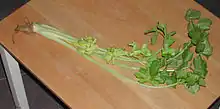Leaf celery
Leaf celery (Apium graveolens var. secalinum Alef.),[1][2][3] also called Chinese celery or Nan Ling celery, is a variety of celery cultivated in East Asian countries for its edible, flavorful stalks and leaves.[4]
| Leaf celery | |
|---|---|
 | |
| Scientific classification | |
| Kingdom: | |
| (unranked): | |
| (unranked): | |
| (unranked): | |
| Order: | |
| Family: | |
| Genus: | |
| Species: | |
| Variety: | A. g. var. secalinum |
| Trinomial name | |
| Apium graveolens var. secalinum Alef. | |
The stems are thinner than those of Western celery, and curved into round, hollow stalks. Also, unlike with Western celery, the leaves are used as well as the stalks.[5]
See also
References
- Small, Ernest (1997). "Apium graveolens L. var. secalinum Alef.". Culinary herbs. Ottawa, Canada: NRC Research Press. pp. 121. ISBN 9780660166681.
- "Apium graveolens L. var. secalinum Alef". Germplasm Resources Information Network. Agricultural Research Service, United States Department of Agriculture. Retrieved 11 June 2017.
- Filipski, Gerald (20 January 2017). "Growing Things: Boost light to keep geraniums and jade plants healthy during winter". Edmonton Journal. Retrieved 11 June 2017.
- Jacewicz, Natalie (13 June 2016). "Celery: Why?". NPR. Retrieved 28 May 2017.
- Larkcom, Joy (2008). Oriental Vegetables: The Complete Guide for the Gardening Cook. Kodansha America. ISBN 9781568363707. Retrieved 29 May 2017.
External links
- "Apium graveolens var. secalinum". Germplasm Resources Information Network. Agricultural Research Service, United States Department of Agriculture.
This article is issued from Wikipedia. The text is licensed under Creative Commons - Attribution - Sharealike. Additional terms may apply for the media files.